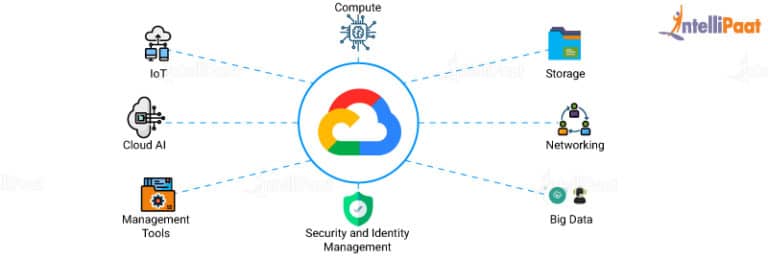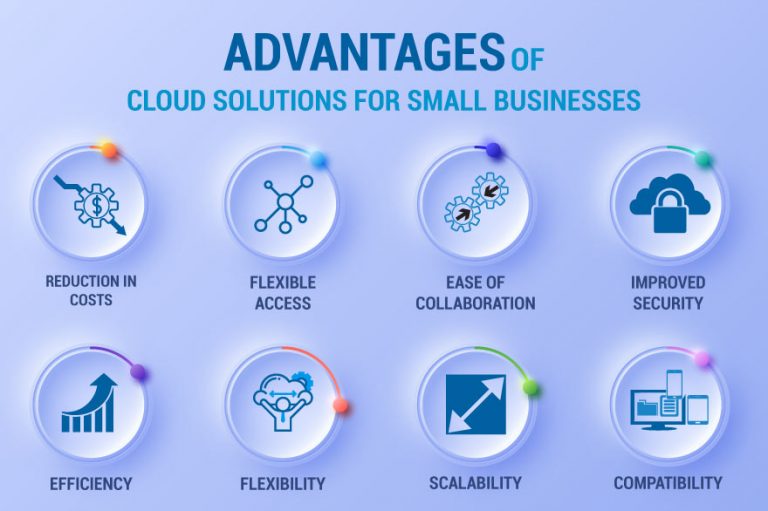Selecting the Ideal Cloud Platform for Your Startup
Choosing the best cloud computing solutions for startups is a critical decision that can significantly impact a startup’s success. Factors like scalability, cost-effectiveness, and security are paramount when selecting a cloud platform. Scalability ensures that the chosen solution can accommodate the startup’s growing needs without compromising performance or stability. Cost-effectiveness is equally important, as it helps startups optimize their budget and allocate resources efficiently. Security, on the other hand, guarantees data protection and compliance with industry regulations, which is essential for building trust with customers and stakeholders.

Key Cloud Computing Solutions for Startups
When it comes to selecting the best cloud computing solutions for startups, there are several prominent platforms to consider. Amazon Web Services (AWS), Microsoft Azure, Google Cloud Platform (GCP), and IBM Cloud are among the most popular options tailored for startups. These platforms offer a wide range of services and features designed to meet the unique needs of startups, from storage and computing to database and machine learning services.
Amazon Web Services (AWS) is a comprehensive solution that offers a vast array of services, including storage, computing, and database services. AWS’s scalability and cost-effectiveness make it an ideal choice for startups looking to optimize their budget and resources. Additionally, AWS offers various tools and resources to help startups get started quickly and easily.
Microsoft Azure is another versatile option for startups, offering compatibility with various programming languages and integration capabilities. Azure’s hybrid cloud capabilities allow startups to leverage both public and private clouds, providing flexibility and scalability. Moreover, Azure’s pay-as-you-go pricing model ensures cost-effectiveness, making it an attractive option for startups.
Google Cloud Platform (GCP) is a startup-friendly solution that boasts a user-friendly interface, data analytics tools, and machine learning capabilities. GCP’s data analytics tools enable startups to analyze and gain insights from large datasets, while its machine learning capabilities allow startups to build and deploy intelligent applications. GCP’s pricing model is also cost-effective, making it an attractive option for startups looking to optimize their budget.
IBM Cloud is a secure and reliable solution for startups, offering robust security measures and artificial intelligence (AI) offerings. IBM Cloud’s security measures include encryption, firewalls, and access controls, ensuring data protection and compliance with industry regulations. IBM Cloud’s AI offerings enable startups to build and deploy intelligent applications, providing a competitive edge in the market.
Amazon Web Services (AWS): A Comprehensive Solution for Startups
Amazon Web Services (AWS) is a comprehensive cloud computing solution that offers a wide range of services tailored for startups. AWS’s offerings include storage, computing, and database services, among others, making it an ideal choice for startups looking for a one-stop solution for their cloud computing needs.
AWS’s storage services, such as Amazon S3 and Amazon EBS, provide scalable and secure storage options for startups. These services enable startups to store and access large amounts of data, making it easier to manage and analyze data for business insights. AWS’s computing services, such as Amazon EC2 and Amazon Lambda, provide scalable computing power, enabling startups to run applications and workloads efficiently.
AWS’s database services, such as Amazon RDS and Amazon DynamoDB, provide scalable and secure database solutions for startups. These services enable startups to manage and analyze data efficiently, providing valuable insights for business decision-making. AWS’s database services also offer automatic backups, patch management, and failover support, ensuring data protection and availability.
AWS’s cost-effectiveness is another significant advantage for startups. AWS offers a pay-as-you-go pricing model, enabling startups to pay only for the services they use. AWS also offers various cost optimization tools, such as AWS Cost Explorer and AWS Budgets, enabling startups to monitor and optimize their cloud computing costs.
AWS’s scalability is another critical factor that makes it an ideal choice for startups. AWS’s cloud infrastructure enables startups to scale their computing resources up or down as needed, providing flexibility and agility. AWS’s scalability also enables startups to handle spikes in traffic and workloads, ensuring optimal performance and availability.
AWS’s security measures are another significant advantage for startups. AWS offers robust security measures, including encryption, firewalls, and access controls, ensuring data protection and compliance with industry regulations. AWS’s security measures also include regular security updates and patches, ensuring that startups’ cloud computing environments are always up-to-date and secure.
Microsoft Azure: A Versatile Option for Startups
Microsoft Azure is a versatile cloud computing solution that offers a wide range of services tailored for startups. Azure’s offerings include virtual machines, databases, and data analytics tools, among others, making it an ideal choice for startups looking for a flexible and scalable cloud computing solution.
Azure’s compatibility with various programming languages is one of its significant advantages for startups. Azure supports a wide range of programming languages, including .NET, Java, Node.js, and Python, enabling startups to build and deploy applications using their preferred programming language.
Azure’s integration capabilities are another significant advantage for startups. Azure offers seamless integration with various Microsoft products, such as Office 365 and Dynamics 365, enabling startups to streamline their business processes and improve productivity.
Azure’s virtual machines provide scalable computing power, enabling startups to run applications and workloads efficiently. Azure’s virtual machines also offer automatic scaling, enabling startups to handle spikes in traffic and workloads, ensuring optimal performance and availability.
Azure’s database services, such as Azure SQL Database and Azure Cosmos DB, provide scalable and secure database solutions for startups. These services enable startups to manage and analyze data efficiently, providing valuable insights for business decision-making. Azure’s database services also offer automatic backups, patch management, and failover support, ensuring data protection and availability.
Azure’s cost-effectiveness is another significant advantage for startups. Azure offers a pay-as-you-go pricing model, enabling startups to pay only for the services they use. Azure also offers various cost optimization tools, such as Azure Cost Management and Azure Advisor, enabling startups to monitor and optimize their cloud computing costs.
Azure’s security measures are another significant advantage for startups. Azure offers robust security measures, including encryption, firewalls, and access controls, ensuring data protection and compliance with industry regulations. Azure’s security measures also include regular security updates and patches, ensuring that startups’ cloud computing environments are always up-to-date and secure.
Google Cloud Platform (GCP): A Startup-Friendly Solution
Google Cloud Platform (GCP) is a user-friendly and innovative cloud computing solution that offers a wide range of services tailored for startups. GCP’s offerings include storage, computing, and data analytics tools, among others, making it an ideal choice for startups looking for a scalable and cost-effective cloud computing solution.
GCP’s user-friendly interface is one of its significant advantages for startups. GCP’s intuitive and easy-to-use interface enables startups to quickly and easily build, deploy, and manage applications and workloads in the cloud.
GCP’s data analytics tools are another significant advantage for startups. GCP offers a wide range of data analytics tools, such as BigQuery and Data Studio, enabling startups to analyze and visualize data efficiently. These tools provide valuable insights for business decision-making, enabling startups to make data-driven decisions and improve their business outcomes.
GCP’s machine learning capabilities are another significant advantage for startups. GCP offers a wide range of machine learning tools, such as AutoML and TensorFlow, enabling startups to build and deploy machine learning models efficiently. These tools provide startups with the ability to leverage the power of artificial intelligence (AI) and machine learning, enabling them to innovate and stay ahead of the competition.
GCP’s cost-effectiveness is another significant advantage for startups. GCP offers a pay-as-you-go pricing model, enabling startups to pay only for the services they use. GCP also offers various cost optimization tools, such as Google Cloud Cost Management and Google Cloud Billing, enabling startups to monitor and optimize their cloud computing costs.
GCP’s security measures are another significant advantage for startups. GCP offers robust security measures, including encryption, firewalls, and access controls, ensuring data protection and compliance with industry regulations. GCP’s security measures also include regular security updates and patches, ensuring that startups’ cloud computing environments are always up-to-date and secure.
GCP’s compatibility with various programming languages is another significant advantage for startups. GCP supports a wide range of programming languages, including Python, Java, and Node.js, enabling startups to build and deploy applications using their preferred programming language.

IBM Cloud: A Secure and Reliable Solution for Startups
IBM Cloud is a robust and secure cloud computing solution that offers a wide range of services tailored for startups. IBM Cloud’s offerings include storage, computing, and artificial intelligence (AI) tools, among others, making it an ideal choice for startups looking for a secure and reliable cloud computing solution.
IBM Cloud’s security measures are one of its significant advantages for startups. IBM Cloud offers robust security measures, including encryption, firewalls, and access controls, ensuring data protection and compliance with industry regulations. IBM Cloud’s security measures also include regular security updates and patches, ensuring that startups’ cloud computing environments are always up-to-date and secure.
IBM Cloud’s AI offerings are another significant advantage for startups. IBM Cloud offers a wide range of AI tools, such as IBM Watson, enabling startups to build and deploy AI models efficiently. These tools provide startups with the ability to leverage the power of AI, enabling them to innovate and stay ahead of the competition.
IBM Cloud’s compatibility with various programming languages is another significant advantage for startups. IBM Cloud supports a wide range of programming languages, including Python, Java, and Node.js, enabling startups to build and deploy applications using their preferred programming language.
IBM Cloud’s cost-effectiveness is another significant advantage for startups. IBM Cloud offers a pay-as-you-go pricing model, enabling startups to pay only for the services they use. IBM Cloud also offers various cost optimization tools, such as IBM Cloud Cost Management and IBM Cloud Billing, enabling startups to monitor and optimize their cloud computing costs.
IBM Cloud’s scalability is another significant advantage for startups. IBM Cloud offers a wide range of scalable services, enabling startups to quickly and easily scale their cloud computing resources up or down as needed. This scalability ensures that startups can handle spikes in traffic and demand, enabling them to maintain optimal performance and availability.
IBM Cloud’s reliability is another significant advantage for startups. IBM Cloud offers a highly available and redundant cloud computing environment, ensuring that startups’ applications and workloads are always available and accessible. IBM Cloud’s reliability also includes disaster recovery and backup services, ensuring that startups’ data is always protected and recoverable in the event of an unexpected outage or disaster.

How to Implement Cloud Computing Solutions for Your Startup
Implementing cloud computing solutions for your startup can be a complex and challenging process. However, by following a few simple steps, you can ensure a smooth and successful implementation. Here’s a step-by-step guide to implementing cloud computing solutions for your startup:
Step 1: Assess Your Needs
The first step in implementing cloud computing solutions for your startup is to assess your needs. Consider the following factors:
- What are your storage needs?
- What are your computing needs?
- What are your database needs?
- What are your security needs?
- What are your scalability needs?
- What are your cost needs?
Answering these questions will help you determine the right cloud computing solution for your startup.
Step 2: Choose a Cloud Computing Provider
Once you’ve assessed your needs, it’s time to choose a cloud computing provider. Consider the following factors:
- Cost
- Scalability
- Security
- Compatibility with your existing systems
- Integration capabilities
- Customer support
Some of the top cloud computing providers for startups include Amazon Web Services (AWS), Microsoft Azure, Google Cloud Platform (GCP), and IBM Cloud.
Step 3: Plan Your Data Migration
Once you’ve chosen a cloud computing provider, it’s time to plan your data migration. Consider the following factors:
- What data will you migrate?
- How will you migrate the data?
- How will you ensure data integrity during the migration?
- How will you test the migration to ensure it was successful?
Planning your data migration carefully will help ensure a smooth and successful migration.
Step 4: Train Your Staff
Once you’ve migrated your data, it’s time to train your staff on the new cloud computing solution. Consider the following factors:
- What training resources does the cloud computing provider offer?
- How will you ensure that all staff members are trained?
- How will you handle ongoing training as new features and updates are released?
Training your staff on the new cloud computing solution will help ensure a smooth and successful implementation.
Step 5: Monitor and Optimize Your Cloud Computing Solution
Once your cloud computing solution is up and running, it’s important to monitor and optimize it. Consider the following factors:
- How will you monitor your cloud computing costs?
- How will you ensure that your cloud computing solution is secure?
- How will you ensure that your cloud computing solution is scalable?
- How will you optimize your cloud computing solution for performance?
Monitoring and optimizing your cloud computing solution will help ensure that it continues to meet your startup’s needs over time.
Maximizing Startup Growth with Cloud Computing Solutions
In conclusion, choosing the right cloud computing solution is crucial for the success of any startup. By selecting a platform that offers scalability, cost-effectiveness, and robust security measures, startups can focus on growing their business without worrying about their IT infrastructure. In this article, we have explored some of the top cloud computing solutions for startups, including Amazon Web Services (AWS), Microsoft Azure, Google Cloud Platform (GCP), and IBM Cloud. Each of these platforms offers unique features and benefits that cater specifically to startups.
AWS provides a comprehensive solution for startups with its extensive range of storage, computing, and database services. Microsoft Azure is a versatile option that is compatible with various programming languages and offers seamless integration capabilities. GCP is a startup-friendly solution that boasts a user-friendly interface, powerful data analytics tools, and machine learning capabilities. IBM Cloud is a secure and reliable solution that offers robust security measures and artificial intelligence (AI) offerings.
Implementing cloud computing solutions for your startup can be a complex and challenging process. However, by following a few simple steps, you can ensure a smooth and successful implementation. These steps include assessing your needs, choosing a cloud computing provider, planning your data migration, training your staff, and monitoring and optimizing your cloud computing solution. By taking these steps, you can ensure that your cloud computing solution meets your startup’s needs and helps drive growth and success.
In summary, the best cloud computing solutions for startups offer a range of benefits that can help drive growth and success. By choosing the right cloud computing solution, startups can enjoy scalability, cost-effectiveness, and robust security measures, allowing them to focus on what they do best – growing their business.

